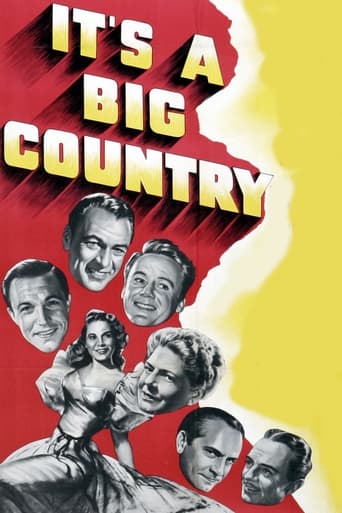marcslope
Expensive and all-star and in production for most of 1950 and 51, this MGM anthology reflects what patriotism looked like in the Cold War era, and uncertainly jumbled together comic and dramatic episodes. A couple just pass muster: There's one where Ethel Barrymore is a sad Boston matron dismayed to learn she hasn't been counted in the census, and in another, Marjorie Main is excellent as a grieving mother visited by her dead son's war buddy. Most of the stories just aren't interesting, and there's some amazing miscasting: Gene Kelly as a Greek entrepreneur making goo-goo eyes at Janet Leigh (and S.Z. Sakall rattling his cheeks as her father), Fredric March (in a rare bad performance) as a stupid Italian immigrant arguing with schoolteacher Nancy Davis over whether his son should have eyeglasses, Gary Cooper over-drawling as a Texan mis-explaining the Lone Star State. There's a welcome but perfunctory documentary about great African Americans, and William Powell is elegant in the opening segment. There's also a lot of narration, and if I'm not mistaken, it's Louis Calhern. It was understandable that MGM wanted to celebrate America in the early '50s, but couldn't they have come up with some better plots?
jjnxn-1
Collection of stories to show the melting pot aspect of the USA. The film is blessed with an array of talent that only could be pulled together in Hollywood at its peak. Episodic by nature and all the vignettes have their charm but the first three are really the best.William Powell and James Whitmore breeze their way through a lively discussion of the ever evolving nature of the country. Their reactions to each other are what makes the skit.Next up is a little story about not being lost in the crowd made charming by Ethel Barrymore's gentle performance. The next segment is a tribute to notable African Americans which is nice in and of itself but that's also why it's a bit problematic. Considering the time it was made the isolated state of the short would have made it easy to snip out in the South. Of course the same could be said for any of the stories but since their are not people of color in any of the other segments it's rather obvious that was the intention at the time. Still it's a nice opportunity to see the significant Americans it spotlights.The other sections all showing various slices of life, aside from Gary Cooper's star bit simply representing Texas, are pleasant but are on the sticky side of sweet.
mountainkath
I wanted to like this film. I really did. But, I could not. The premise was a great idea, but it was poorly executed. The only reason I kept watching was because of the amazing superstar cast.My favorite stories were the first one with the gentlemen on the train discussing America and the Gary Cooper segment where he was talking about Texas. Both of these segments held my attention and I thought they were very well done. Sadly, this was not the case for the rest of the film.I enjoyed the Nancy Davis plot about the boy needing glasses, but it went on a bit too long and seemed to get quite bogged down. I'm a huge Gene Kelly fan and wanted to enjoy his segment more than I did. However, I couldn't help being totally distracted that he and Janet Leigh decided to marry after knowing each other just a few minutes. I know this is a common plot to classic movies, but it still distracted me. Another distraction was Kelly romancing a woman much younger than him but again...this was a common theme in classic movies (and Kelly movies).I enjoyed Ethel Barrymore's segment solely because of Barrymore. The plot was so thin and dragged on much too long.I'm glad I watched this movie (seeing so many stars over the course of just 90 minutes was a real treat), but I doubt I'll ever watch it again.
dbdumonteil
This par excellence a film only the American could make.I cannot imagine a French,English or Italian director making a movie to glorify his/her country.Wellmann and co tell us that America is a big country ,with big differences but where everybody has his place in the sun: in the "celebrities" segment,there are plenty of black artists such as Armstrong ,but the civil rights were ignored in 1949.What saves this naive film containing more finer feelings than a Capra movie,is some kind of humor .Take the first scene on a train and the last sentence of the baffled traveler or the Hungarian daddy who does not want his daughters to marry a Greek,cause we are "enemies" .How great the melting pot is!And so are Gene Kelly and Janet Leigh.Some stars only appear a few minutes:Gary Cooper tells us what a wonderful state "Lone Star" Texas is where oil spurts out everywhere under your feet;Ethel Barrymore plays a delightful old lady who is cross cause she was not counted when they took a census of the population.The last sketch ,about glasses ,was perhaps not a very good choice to conclude the movie.It was,is and will always be a big country.


